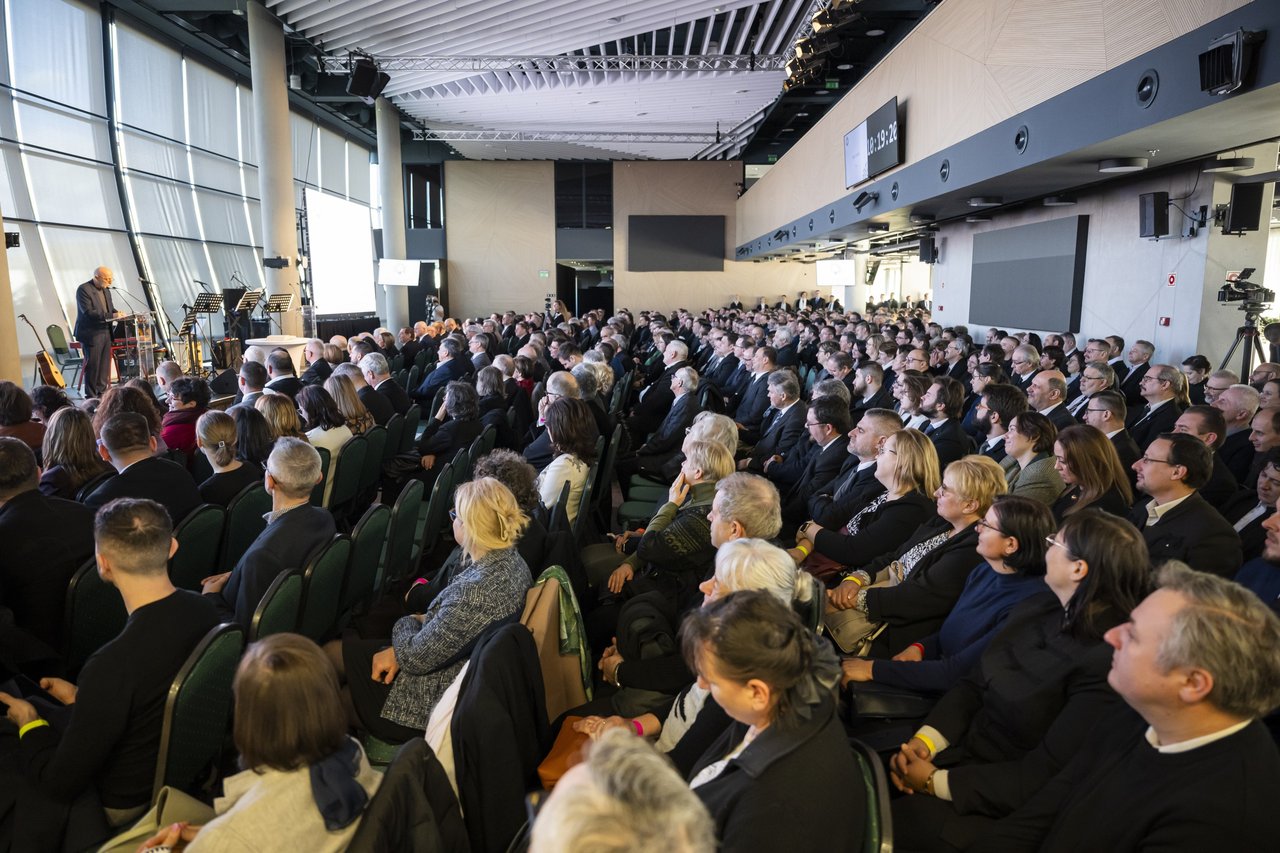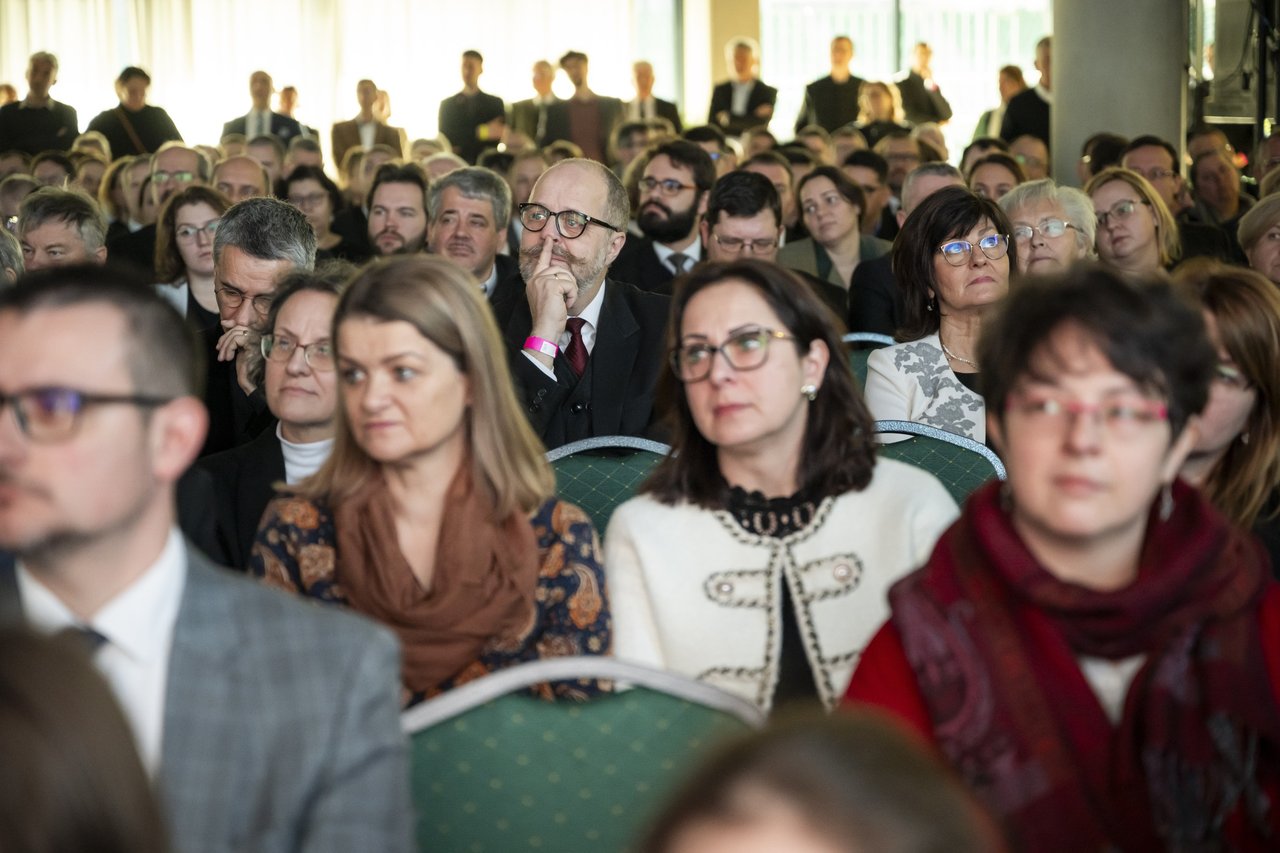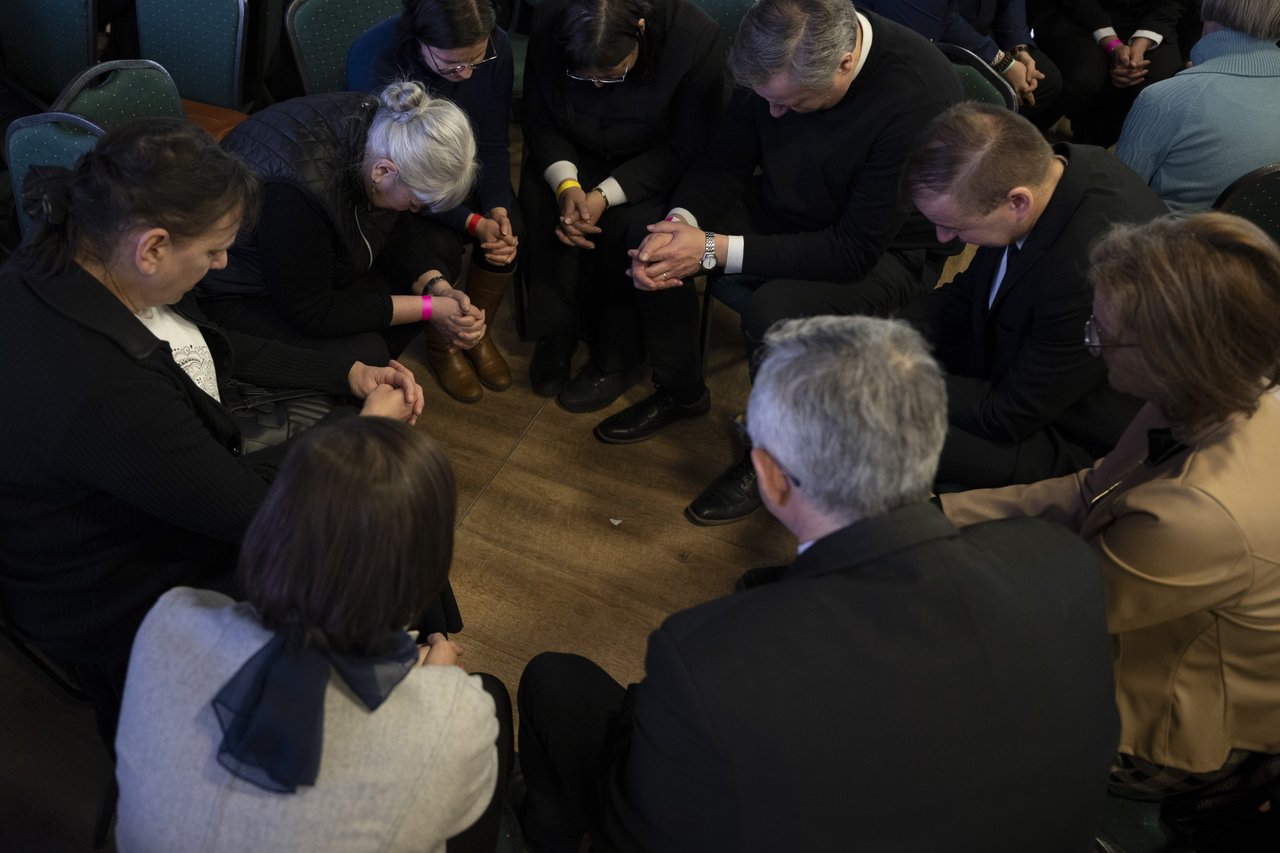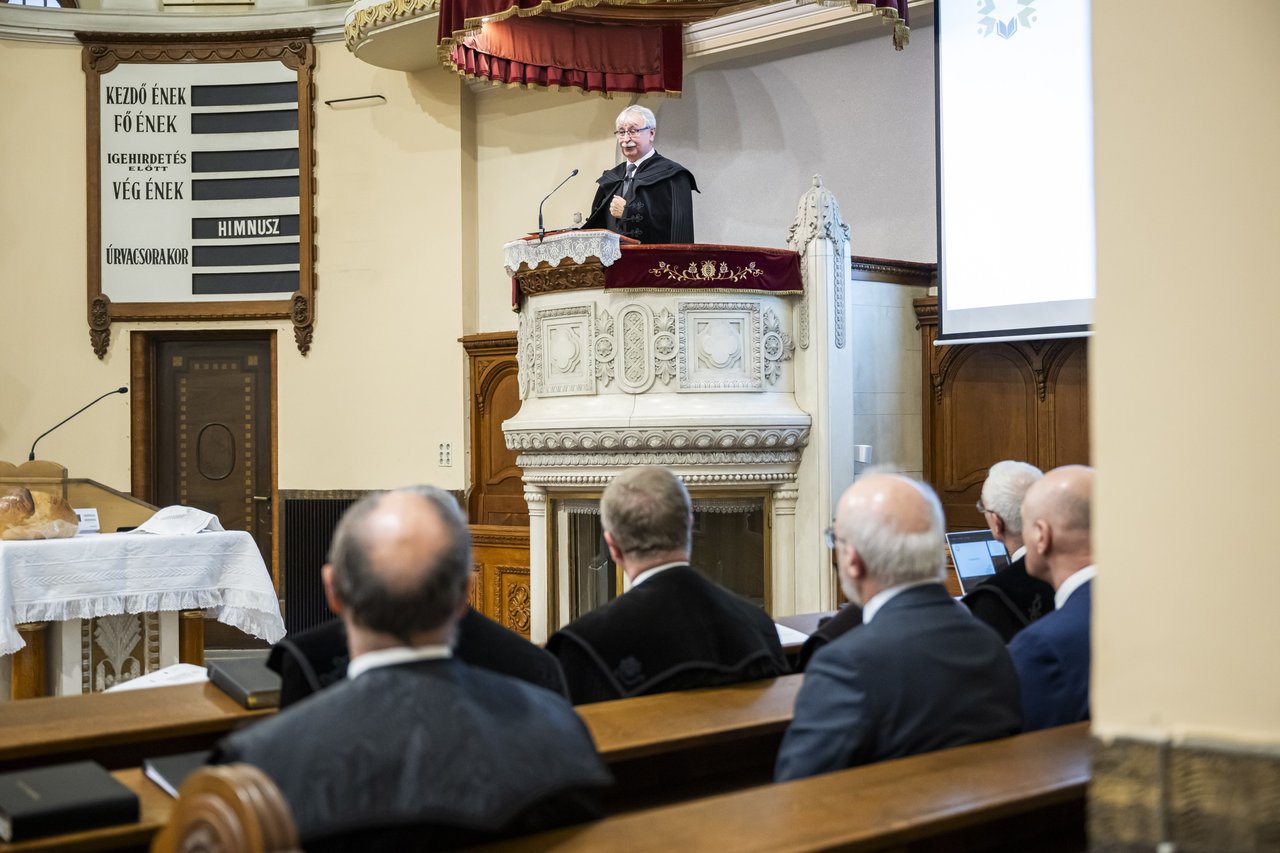Almost a thousand people attended the meeting of Reformed pastors from Hungary and Slovakia at the Groupama Arena in Budapest, which was both the closing event of the Year of the Pastoral Profession 2023 and the opening event of the Year of the Living Word 2024.
"We want to grasp something quite different from ourselves, yet we experience the real miracle of Christ's grace shining not only on us but also through our lives, in a superhuman assurance" was the opening thought of the meeting by Levente Zoltán Hajdú, Head of the Mission Service of the Reformed Church in Hungary. "The Living Word calls us to life again and again. Unceasing reformation is action placed in the will of God. This is the reality of the Christian Church. Is this our reality? Do you want to live in it? Do you experience the wonder of it?" he asked the assembly in his message for the Year of the Living Word, adding that the Word that makes us alive is also reckoning with us.
The Living Word is a Living Person
In his welcoming message, Bishop Zoltán Balog of the Danubian Reformed Church District, the ministerial president of the Synod, called it a gift that we can be part of each other's lives, that God has placed us in the community of the Hungarian Reformed people out of love and entrusted us with a ministry, but at the same time, it is also a test of discernment.
"There is no greater vulnerability than to have the living Word as our tool of work," he explained. The living Word is a living Person: Jesus Christ, who is never in our possession, always to be fought for. "We are here to strengthen one another with the living Word, with what we do not have but can give to one another." He stressed that we cannot live without the living Word, nor do we want to, any more than we can live without each other. "We are seeking a way of common blessing, of common action, and we want to make 2024 special by placing at the centre of our lives the self-evidence of the living Word that no one can possess. We want to show how the Word is at work in the lives of those who follow Christ, the living Word," the Bishop said.

Photo: László Sebestyén
No Life Without Love
"On the day of the proclamation of the Year of the Living Word, I want to talk about love. I was not only born out of love, I was also born a believer out of love," said András Visky, writer, dramaturg, and patron of the Year of the Living Word.
As he said, love is the reality of things hoped for, and without love, we would not exist; we understand the world through it, and without it, no one can be pleasing to the Eternal.
"I was surrounded by people in love, people I grew up with, who instead of keeping to themselves turned towards their own reality. Misty-eyed Romeos and Juliets who were in love not with each other but with the Almighty," he recalled, first of all, the memory of his parents, and then of the men of faith whom he called the heirs of the truth of love, who, through their unquenchable love, did justice to those whom the world did not deserve.
"The living Word is not a word, not a speech, but a birth. If there is no birth, there is nothing. If you're not in love, you should not do anything."
Cloud of Witnesses
The backbone of the event was the testimonies that pointed to the transforming and life-changing power of the living Word. Each personal testimony was introduced by Kossuth Prize-winning actor Ildikó Hűvösvölgyi, who read out a Word or passage of Scripture that played an important role in the lives of the speakers.
László Trócsányi, Rector of the Károli Gáspár Reformed University, referring to his appointment two years ago, said that we often do not know or do not want to recognize the ways of Providence. Referring to the name of the university, he stressed that the university has a double mission, in which, according to the missionary commandment, it is their task to ensure that students who have not yet heard the Word encounter not only academic truth but also the truth of faith within the walls of the institution.
Veronika Ádám, a Széchenyi Prize-winning doctor and biochemist, also pointed out where the living Word leads in the world of science and beyond. "Science says that the world can be known. But man wants to understand more than the material world. Here, he can no longer rely on science," he said, adding that the Bible promises a wisdom different from the ordinary, changing how we relate to science.
József Steinbach, Bishop of the Transdanubian Reformed Church District, highlighted the miracle of Christian witness. "On the basis of the written Word, we proclaim the living Word, who is Jesus Christ, and the Gospel which he brought into the world." In his prayer, the bishop asked God to give us the Word, which will become a letter and then a stone, so that from it may come the bread of life and the dead letter may be revived.
In her testimony, the President of the Republic, Katalin Novák, shared the key to making decisions that affect the whole nation, not oppressive but liberating.
"For a long time, I didn't consciously seek God. At 35, with a strong family background, a loving husband, three young children, and a promising career outlook, I felt my life was round. It was round. It just didn't have a centre," she said. She likened the appearance of Christ in her life to the dawn of the morning, which first reveals only contours and then slowly comes into focus.
Anett Győri-Daniné Tóth, the pastor of the Balatonszabadi congregation, recalled David's testimony, "He had already won a victory before he stepped into the battlefield. He was chosen by God, just as we are chosen by God. David won because he knew God was on his side, and he remembered that." She recalled that when she arrived in Balatonszabadi, she bore witness to a God of hope in a desperate situation, and David's story was a testimony of hope for him then and now.
As a Reformed winemaker, Pál Mészáros testified to how God has shaped him over the decades. The presbyter from Szekszárd expressed his gratitude that he was able to serve alongside three pastors, that God always gave him the best people to help him, and that the Lord's blessing became tangible for him in his vocation, the wine industry.
After the prayer of Pál Molnár, the lay president of the Cistibiscan Church District, Béla Kató, the bishop of Transylvania, Pál Nemes, the lay president of the Transdanubian Church District and Dániel Pásztor, the bishop of the Cistibiscan Church District, the participants continued the silence in prayer groups. Afterward the common prayer continued, with Ferenc Porubán, the lay president of the Reformed Christian Church in Slovakia, reading from the Holy Scriptures, and the prayers led by János Molnár, the lay president of the Transtibiscan Church District and the lay president of the Synod, Károly Fekete, the bishop of the Transtibiscan Church District, and Sándor Veres, the lay president of the Danubian Church District.

Photo: László Sebestyén
The Spectrum of the Pastoral Vocation
“The pastoral vocation is the most poignant issue, on which lives, destinies, deliverances, saving of lives and souls depends,” said András Gér, the general secretary of the Synod, in his speech summing up the year of the pastoral vocation. The three main areas of recruitment, formation, and accompaniment will remain prominent in the Year of the Living Word.
As the final programme of the Year of the Pastoral Profession, participants were able to join one of seven group discussions. Zsófia Mucsi, Márton Járay, and László Thoma spoke about accompanying and supporting pastors, sharing details of the preliminary results of a survey among pastors. They also presented the services of the renewed Gyökössy Institute, which offers group programmes for pastors to maintain their spiritual health, practice fellowship with each other, and deepen their vocation.
In another group, participants received insight into the organisational background of pastors. Márta Svébisné Juhász, Imre Bor, and Áron Ablonczy presented the ministries of the Reformed Women's Association, the Hungarian Reformed Presbyterian Association, and youth organisations.
In the small group discussion "How to make our church life more vibrant - 2024, the Year of the Living Word,” Levente Hajdú Zoltán Hajdú explained that the systemic strengthening of church organization stands on four legs: the spiritual support of ministers, the development of the church Intranet, the identity research and the survey work of the Church Building and Church Strategy Task Force. The principle has been established that anything that does not specifically help the life of local churches is unnecessary and downright harmful.
Bendegúz Kovách I., the project leader of the Year of the Living Word, said that by helping grassroots initiatives, we want to make the Word stir people's hearts repeatedly. Instead of forcing new structures, they seek ways to support the ministry. To do this, from February on, three types of application will be open to parishes, presbyteries, and organisations. The calls for proposals will be uploaded on the eloige2024.hu website, along with a range of other useful supporting content.
Szilveszter Molnár Füsti, the theology teacher at the Reformed Theological Academy of Sárospatak, emphasized the importance of dialogue and solidarity, which should be strengthened among the congregations. "We must open our doors to society. The example of Jesus Christ is a guide: we need to know the world even better than ourselves," he said, referring to the dialogue with society, which he said can only be sustained if we are on solid ground and know who we are talking to.
Pastor András Beszterczey and sociologist Bálint Duráczky sought answers to the question of what is the Reformed identity in another group. In his short theological introduction, the pastor of the Reformed Congregation of Debrecen-Nagytemplom Reformed Church said that the Reformed Church is a church that confesses Christ and can be renewed ceaselessly - even if many congregations seem old-fashioned at first glance. András Beszterczey sees commitment, sacrifice, and regularity as the three pillars of our Reformed identity. He also spoke briefly about the threats and opportunities that surround the church. These include the tension between the people’s church and the confessing church, secularisation, political Christianity, institutionalisation, liberalisation, radicalisation, centralisation, and clericalisation.
The staff of the Mission Service of the Synod, Dóra Császár-Harangozó, Péter Szűcs, and Rita Varga shared details about the Reformed Intranet, which will be available to all Reformed public administration actors and institutions beginning 17 January 2024. The internal networking platform will make administration easier and more transparent, but it will also provide support materials for congregational ministry.
Pastors Gábor Gere, Lívia Hajdú Tóth, Zsoltné Nagy, and Elődné Szabó spoke in their group about the mission opportunities in the institutions. They shared about the joys and challenges of this type of ministry, what mission in an institution even means, how it can be handled in a healthy way when other sustainers are present in a given locality, whether an institutional ministry can become meaningless, and then raised the question of whether the congregation or the institution carries the other on its back. According to Lívia Hajdúné Tóth, only a strong congregation should be allowed to take on the responsibility of maintaining an institution. Gábor Gere said that the two should work side by side, and Elődné Szabó pointed out that the spiritual work in an institution is only really effective if there is a congregation in which the life of the person being addressed can become fruitful.
Moderated by secretary general of the Synod András Gér, retired bishop József Csomós of the Cistibiscan Church District, Anett Győri-Daniné Tóth of Balatonszabadi, and Péter Zila, pastor of the Nagyvárad Square congregations, discussed the turning points of the pastoral profession on three main topics. First, they shared their thoughts on how they received their call, then on what strengthens them in their ministry and what keeps pastors in ministry.
At the pastors' meeting, the Károly Dobos Award was presented, which, in the words of ZoltánLevente Hajdú, testifies to what it means to be faithful throughout one's life, to stand firm in a ministry whose essence and true support is given by the Lord Himself. This year's recipient is András Ősz, a Reformed pastor who has been serving in Rétközberenc since 1986. In his testimony, he said that he reflects with wonder and reverence on God's plan for his life and all our lives.

Photo: László Sebestyén
The Word That Lives With Us
"For the Word of God is living and active, sharper than any two-edged sword" was the message of the closing service in the Reformed Church of Nagyvárad Square, based on the 12th verse of Hebrews 4. In his homily, Bishop Róbert Géresi of the Reformed Christian Church in Slovakia said that thanks to Christ's victory, we are on the way to salvation, but we can also be stopped on the way. However, the living Word is still with us, so we can experience its living and active nature.
The service ended with communion, with a joint service of the bishops and the lay presidents of the church districts.

Photo: László Sebestyén